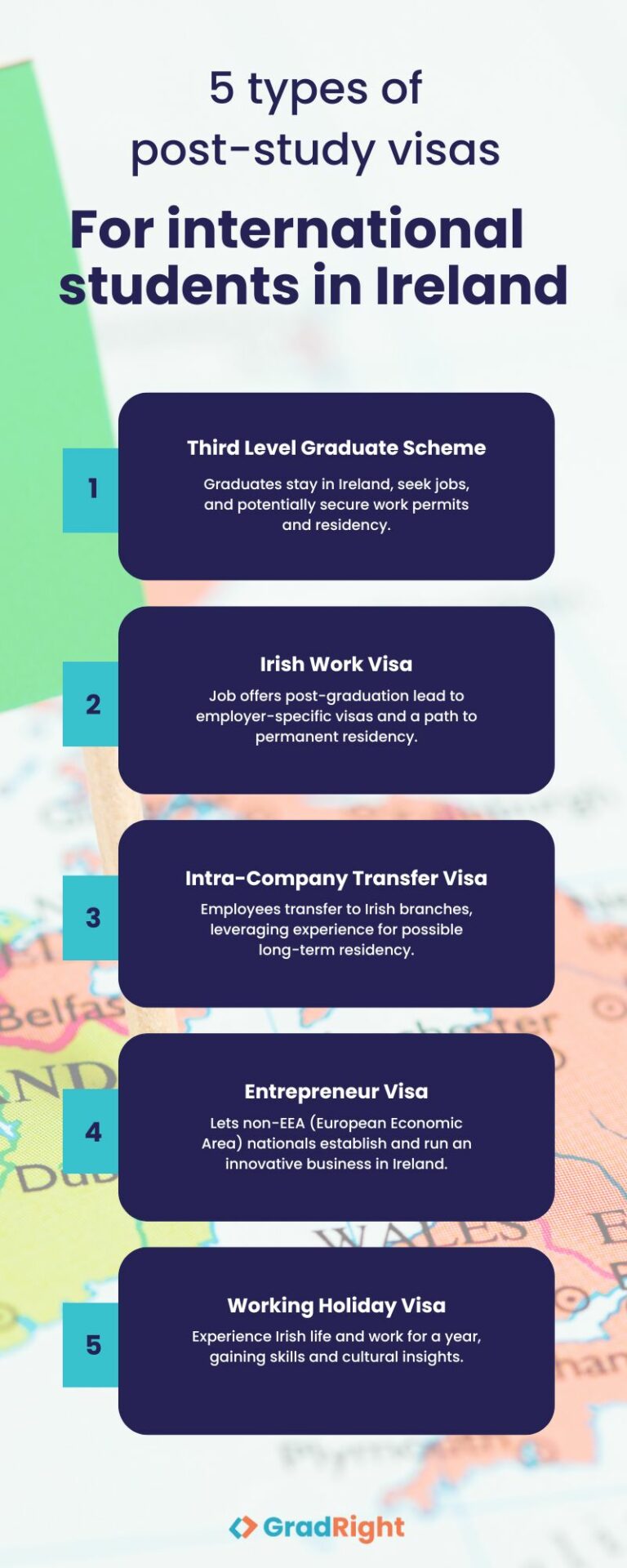Many students dream of studying abroad, with Ireland as a top choice. Permanent Residency (PR) grants you the freedom to live, work, and study in Ireland for an extended period. This can be a fantastic option for international students who want to build a future in the beautiful Emerald Isle.
How easy is it to get a PR in Ireland after studying? While it requires planning and effort, it certainly isn’t impossible. We will explain the process and help you determine if getting a PR after studying in Ireland is the right path for you.
Getting a PR in Ireland after studying is not just a dream; it’s a goal you can achieve. This guide will help you understand how to get there.
What is PR?
Permanent residency (PR) is a status that lets people live in a country for as long as they want. Getting a PR in Ireland after studying there means you can stay in Ireland without time limits.
Think of it like a special status that allows you to live and work in Ireland for a long time, just like a citizen. PR grants you long-term stability, unlike a visa that might need regular renewal. This means you won’t have to worry about visa renewals and can freely enter and leave Ireland. It is important for students who wish to build their lives in Ireland.
Is it easy to get PR in Ireland after studying? Getting a PR requires you to live in Ireland for a certain period and meet other criteria. For students, this means staying in Ireland after your studies and working under specific visas that lead to a PR.
Now, you might get a bit confused between getting a PR in Ireland, and Irish citizenship.
Here’s the difference between the two. While PR gives you extensive rights, you won’t be able to vote in national elections. However, you can still enjoy many benefits. The main ones are as under.
- Access to Ireland’s social security system (healthcare, etc.)
- The freedom to work for any company in Ireland
- The ability to travel freely within the European Union (EU)
So, is PR after studying in Ireland the right option for you? This will depend on your goals. If you see yourself building a future in Ireland, PR might be a perfect fit. We’ll explore the benefits of PR in more detail in the next section.
Also Read: Study in Ireland: Process, Requirements, Documents, Visa & Benefits
Benefits of PR in Ireland
Obtaining PR in Ireland after studying unlocks a variety of advantages that can make your life in Ireland secure and fulfilling. Knowing these can help you gauge the pros and cons of studying in Ireland. Here are some of the key benefits to consider.
Live and Work Freely
With PR, you can live anywhere in Ireland and work for any company without needing additional visa permits. This flexibility opens doors to exciting career opportunities.
Long-Term Stability
Unlike temporary visas that require renewal, PR offers peace of mind. You won’t have to stress about visa applications or expiration dates.
Travel Ease
Having PR allows you to freely enter and leave Ireland. You can also travel visa-free within the European Union (EU), opening doors to explore new countries and cultures.
Access to Social Benefits
PR holders qualify for Ireland’s social security system. This includes public healthcare, unemployment benefits, and other social programs.
Education Opportunities
Your children (if any) can attend Irish schools and universities at the same rates as Irish citizens. This can significantly reduce educational costs. You and your children can attend schools and universities around the EU at significantly discounted rates as well.
Path to Citizenship
While PR doesn’t grant voting rights, it paves the way for future citizenship applications if you decide to stay in Ireland for the long term. Note: India does not allow dual citizenship, so you’ll be giving up your Indian passport. However, you will still be eligible for OCI status, which allows you to live and work in India as long as you live.
Business Ownership
PR status allows you to start your own business in Ireland, giving you the freedom to be your own boss.
Family Reunification
Once you have PR, you can sponsor family members to join you in Ireland, making it easier to build a life together. These are just some of the many benefits that come with obtaining PR after studying in Ireland.
Is it easy to get a PR in Ireland after studying? For the process to be easy, knowing how to get a PR in Ireland is crucial. It’s a journey worth considering for a brighter future in Ireland and the greater EU area.
Note: only naturalization allows you to get an Irish passport. With PR you keep your original passport. Let’s explore the requirements and application process in the next section.

Also Read: Why Study in Ireland: Top 7 Reasons To Study Abroad
What is the process of getting a PR?
Obtaining PR in Ireland after studying can be a rewarding path, but it requires planning and meeting certain criteria. Here’s a breakdown of the key steps involved.
Check eligibility
Before diving into the application process, it’s crucial to confirm your eligibility for a PR in Ireland after studying. The Irish immigration authorities consider international students who have completed a full-time program. The program should have lasted at least two years at a recognized Irish university or higher education institution.
Here are some other key eligibility requirements.
Valid Residence Permit
You must have held a valid Irish residence permit throughout your studies. This permit typically allows you to work part-time while enrolled.
Minimum Residence Duration
You need to demonstrate legal residency in Ireland for a specific period after completing your studies. The current requirement is generally two years, although this can vary depending on your visa type.
Work Permit and Employment History
Having a secure work permit in Ireland after graduation strengthens your application. This shows you’re contributing to the Irish economy and have established ties to the country.
Good Character
You must meet Ireland’s good character requirements. This means having a clean criminal record and no history of immigration violations.
Gather required documents
Once you’ve confirmed eligibility, gather the documents to apply for your PR in Ireland after studying. The exact list can vary depending on your individual circumstances. Still, here are some of the common documents you’ll need.
- Completed application form (available from the Irish Immigration Service)
- Valid passport with sufficient remaining validity
- Proof of your current immigration status (residence permit)
- Proof of your qualifications (graduation certificate, transcripts)
- Evidence of your employment history in Ireland (work contracts, payslips)
- Proof of financial resources (bank statements, employment contracts)
- Evidence of private health insurance (if not covered by an employer)
- Police clearance certificates from all countries you’ve resided in for more than six months as an adult. These documents together prove your “good standing” as defined by Irish law.
- You will also need your original application fee payment receipt.
Below is the checklist from the IIS of the documents that you need to submit (photocopies of) when applying for a PR.

It’s recommended to start collecting these documents well in advance to avoid any last-minute delays. Ensure all documents are originals or certified copies and translated into English, if necessary. If your documents are translated, they must also be attested or apostilled by your embassy or high commission to/in Ireland.
Submit your application
With your documents prepared, it’s time to submit your formal application for your PR in Ireland after studying. You can typically submit your application online through the Irish Immigration Service website. You’ll provide details of your background, education, employment, and reasons for seeking PR.
Processing times can vary, but generally take several months. The Irish Immigration Service will keep you updated on the status of your application.
Decision and next steps
After a thorough review of your application, the IIS will issue a decision about your PR in Ireland after studying. You’ll receive a notification by mail or email informing you of the outcome. There are three possible scenarios.
Approval
Congratulations! If your application is approved, you’ll receive a letter confirming your PR status in Ireland. This letter outlines the rights and privileges associated with your PR, including residency conditions (if any).
Request for Further Information
In some cases, the immigration authorities might require additional information or documentation. Carefully review their request and provide the missing details.
Rejection
If your application is rejected, the notification will explain the reasons for the decision. You may have the right to appeal the decision within a specific timeframe, so carefully review the provided information.
Here are some additional tips while you await your decision.
Maintain Valid Status
Ensure you maintain a valid immigration status throughout the application process. This might involve renewing your residence permit if it expires before a decision is reached.
Stay Informed
Regularly check the Irish Immigration Service website for updates on your application status. You may also be able to contact them for inquiries, but avoid making excessive inquiries as this can slow down the process.

Receiving your PR card
If your application for PR in Ireland after studying is successful, you’ll receive an official card (an Irish Residence Permit) by mail. This card serves as physical proof of your PR status and grants you the rights and privileges outlined in the approval letter.
Here’s what to do immediately after receiving your PR card.
Register with the Garda National Immigration Service (GNIS)
Within one month of receiving your PR card, you must register with the GNIS. This is a simple process that can be done online or in person at a GNIS registration office.
Familiarize Yourself with Your PR Conditions
Your PR approval letter might outline specific residency requirements. For example, you might need to spend a certain amount of time each year in Ireland to maintain your PR status. Carefully review these conditions and ensure you comply throughout your residency.
And those were the steps in applying for a PR after studying in Ireland. Next, we will look at some other options that also eventually lead to the same goal.
Also Read: Scholarship for Indian Students in Ireland
Post-study visa options for international students
Getting a PR in Ireland after studying might be your ultimate goal, but there are several other options as well. All of these can eventually lead to Irish PR. Here’s a breakdown of some common routes that can help you bridge the gap between your studies and a permanent future in Ireland.
Third Level Graduate Scheme
This visa lets grad students stay in Ireland for a year. They can find jobs after graduating from accredited programs. You have a great chance to gain work experience in your field with such a visa. It might even land you a job offer, leading to a work permit and permanent residency in Ireland after your studies.
Irish Work Visa
Landing a job offer after graduation opens doors to applying for an Irish Work Visa. This visa is tied to a specific employer and allows you to work for that company in Ireland. Meeting the residency requirements for this visa sets you up for future permanent residency in Ireland.
Intra-Company Transfer Visa
Are you already working for a multinational company with a branch in Ireland? An Intra-Company Transfer Visa might be an option. This visa allows employees of international companies to transfer to their Irish branch for a set period. It can be a great way to leverage your existing experience and potentially pave the way for long-term residency in Ireland.
Start-up Entrepreneur Programme (STEP)
This visa lets non-EEA (European Economic Area) nationals establish and run an innovative business in Ireland. If your business thrives, this visa can be a stepping stone towards securing permanent residency.
Working Holiday Visa
This visa option is perfect if you want to explore working and traveling in Ireland after your studies. You can work for a year in specific sectors. It’s a great way to experience Irish culture firsthand and gain practical skills before moving forward.
So finally, can you get a PR in Ireland after studying there? Yes, provided you meet the requirements. PR is a great long-term goal and post-study visas offer flexibility as they help you settle in the Irish job market. If rejected, you can explore these and transition to PR later.
And with that, we come to the end of this article on getting a PR in Ireland after studying there. We hope you found it useful, and we’ll see you in the next one.

Also Read: Student Visa for USA for Indian Students in 2024 (Guide)
FAQs
1. I don’t have a two-year degree, can I still get a PR in Ireland after studying?
The standard path requires a minimum two-year full-time program. However, there are exceptions. Some one-year postgraduate programs might qualify, especially in critical skills areas. Researching the Irish National Framework of Qualifications (NFQ) and its alignment with your program is recommended.
2. Is there a specific work experience requirement to get a PR in Ireland after studying?
While there’s no set minimum, having relevant work experience in Ireland after graduation strengthens your application. It demonstrates your contribution to the Irish economy and establishes ties to the country. Aim for roles aligned with your qualifications to showcase your skills and commitment to your field.
3. What if I change employers after getting my work permit? Does that affect my PR application?
Changing employers generally doesn’t disqualify you from PR, but it can add some complexity. The Irish immigration service prefers a continuous employment history with a single sponsor. However, if you can demonstrate a clear career progression within your field with the new employer, it can still be considered favourably.
4. Can I apply for a PR in Ireland after studying while I’m still outside the country?
In most cases, no. You typically need to be residing in Ireland with a valid immigration permission to submit a PR application. However, there might be exceptions for specific circumstances. Consulting with an Irish immigration lawyer can provide tailored advice for your situation.
5. How much does it cost to apply for a PR in Ireland after studying?
The current application fee for PR in Ireland is €300 (subject to change). There might be additional costs for required documents like police certificates or medical examinations. Factor these into your budget when planning your application.
6. Is there an advantage to applying for a PR in Ireland over becoming a naturalised citizen?
While both grant permanent residency, there are slight differences. PR allows you to live and work in Ireland freely, but not to vote in national elections. Naturalisation grants full citizenship rights, including voting rights and the ability to hold certain public offices. The path to citizenship typically requires a longer residency period in Ireland.
7. What are some of the challenges of getting a PR in Ireland after studying?
Meeting the residency requirements can be a hurdle, especially if you haven’t secured a job offer before graduation. The application process can also be complex, so thorough research and potentially seeking professional guidance can be helpful. However, with planning and effort, PR in Ireland after studying can be a rewarding path for international students seeking a future in the Emerald Isle.
8. I’ve heard a lot online about getting a PR in Ireland after studying, but how do I find real-world information and advice?
With a topic like PR in Ireland after studying, online forums can be a treasure trove of insights from past and present international students. A Google search using phrases like “how to get PR in Ireland after study Quora” or “how to get PR in Ireland after studying Reddit” can lead you to valuable discussions and experiences shared by others who have navigated this process.
9. I still haven’t decided which Irish graduation program is best for me. What should I do?
While getting a PR is a fantastic long-term goal, choosing the right program is the first step! Join 60,000+ students who found their dream university with SelectRight. See how. We’ll connect you with the perfect program that aligns with your career aspirations and sets you on the path towards a successful future in Ireland.


















